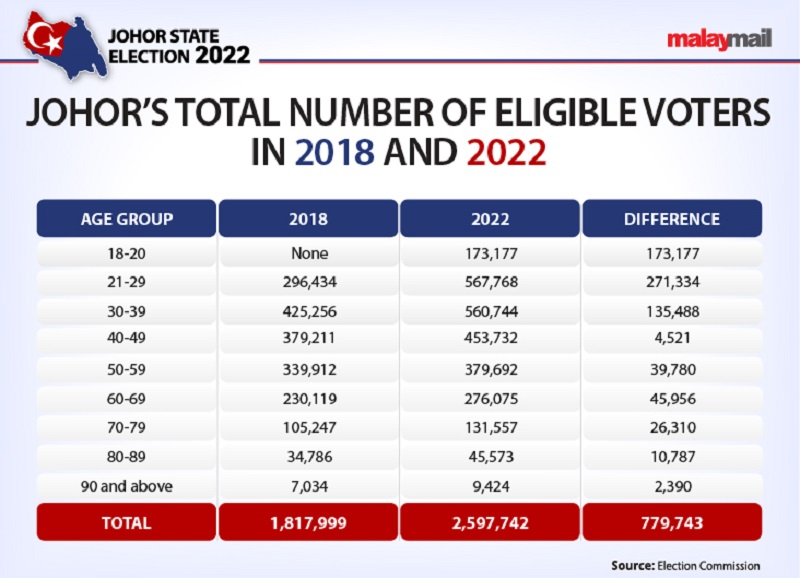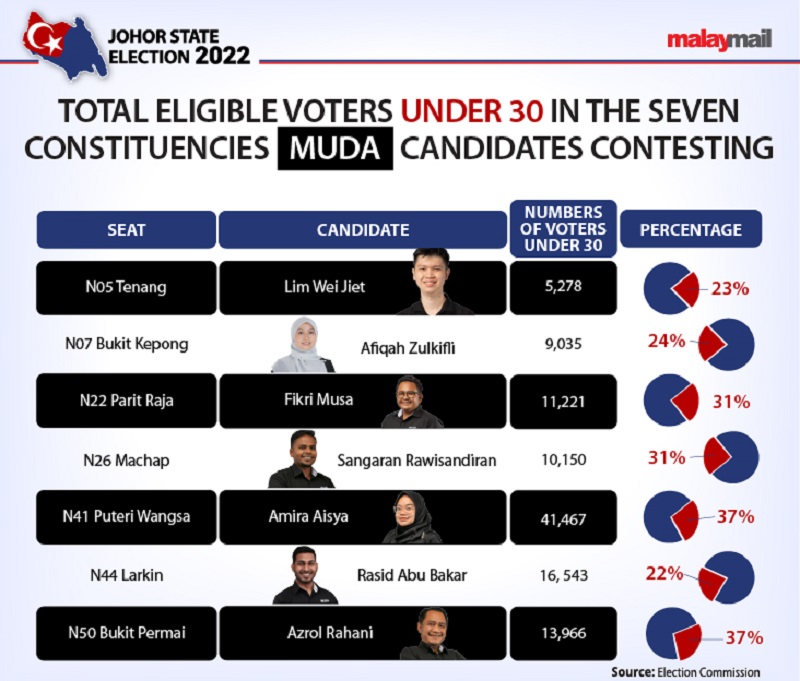Harris Zainul was quoted by the Malay Mail
by Milad Hassandarvish, 8 Mar 2022
KUALA LUMPUR, March 8 ― Johoreans are a few days away from voting in 56 state legislative assembly representatives out of a total of 239 candidates from various political parties.
Unlike previous elections, there are a few new elements for the upcoming 15th state election that has captured the attention of many political observers.
One major new element for the polls is the 779,000 new voters due to the implementation of Undi 18 and the automatic voter registration system.
That’s about a 43 per cent increase in the number of new voters for this election.
However, despite common belief, not all new voters are considered young.
Thanks to the automatic voter registration system, every eligible Malaysian voter, including those who have never voted in their lifetime are automatically put on the electoral roll.
As a result, every age group on Election Commission’s (EC) electoral roll has seen a surge of new voters.

According to EC’s voter breakdown for the Johor election, the Undi 18 bloc (18-20) comprises merely 173,177 voters, while the 21 to 29 years old group has 567,768 registered voters – seeing an over 90 per cent increase from the previous election in 2018.
Based on the data, this year’s Johor election sees an increase of 444,511 new voters for the 18-29 age group and 335,232 for those between 30 and 90 years old.
In total, there will be 740,945 or 28.53 per cent voters under 30 on the electoral roll for the election.
For statistical purposes, the United Nations defines youth as people between the ages of 15 and 24 years.
Muda vs ‘mega’ parties
Expectedly, the campaign trail has so far seen continuous condemnations and the war of words between three former prime ministers-turned-political rivals; namely Tun Dr Mahathir Mohamad, Datuk Seri Najib Razak and Tan Seri Muhyiddin Yassin.
However, there has been a new political movement that seems to try to distance itself from political drama and decided to head into the election solo with a predominant focus on youth.
Led by former youth and sports minister Syed Saddiq Abdul Rahman, the Malaysian United Democratic Alliance (Muda) surprised many when it decided to contest in the Johor state election under its own banner.
Being a member of the opposition front, Muda aims to lead young voters to shake up the political landscape in Malaysia
The partly, however, had a stormy start by making several controversial news headlines over the appointments of entrepreneur-activist Datin Dian Lee and former PKR and Parti Pribumi Bersatu Malaysia (Bersatu) leader Ainie Haziqah as the party’s central executive committee members.
Controversies aside, Muda is fielding seven candidates in constituencies with considerably high young voters.

Out of seven constituencies Muda is currently eyeing, four have more than 30 per cent young voters under 30 years old.
Among them are Puteri Wangsa (37 per cent), Bukit Permai (36 per cent), Parit Raja (31 per cent) and Machap (31 per cent).
Out of the seven seats, five were won by Bersatu and two by Umno in the previous election.
But can the young voters make a significant difference in the Johor election?
Generational shift from older politicians to younger ones
Institute of Strategic and International Studies analyst Harris Zainul said as a neutral observer, he is looking out for how Muda performs in Johor, which is also Syed Saddiq’s home state.
“While they might have captured the imagination of many young Malaysians across the country, I am personally very curious to see if imagination will be translated to votes.”
Harris said some people may think Muda might capture the majority of the Undi 18 bloc with its central appeal being that they are a young group of aspiring politicians.
“And to some, perhaps this clear generational shift from older politicians might be appealing.”
He, however, noted that youth is not a simplistic group, wherein each individual person will have their own dreams and aspirations.
“[Hence], whichever party is able to offer policies aligned with these dreams and aspirations will get the vote.”
Voter turnout is key
Although the election sees a sharp increase in the number of new voters, this is the first time Johor sees a total of 10 political parties and a host of independent candidates contesting in the state election.
Apart from multi-cornered fights, a low voter turnout for the March 12 polling may not be advantageous for newer parties, especially those depending on young voters.
Undi18 co-founder Qyira Yusri said she is concerned over low voter turnout as it was a sudden, unplanned election.
“Sudden elections like this, especially shortly after a major national holiday like the Chinese New Year will make it very difficult for young professionals and students to return home and vote.
“Traveling back home costs time and money, both something that’s not easy to come by for Malaysian youths.”
Qyira, however, hoped that the youths would take this election seriously and be critical of the politicians and their promises.
“It is not only because the election is historical due to the influx of new voters but also because it’s important to have your voices heard.
“Elections can’t just be a platform for political drama and mudslinging, but a genuine litmus test for our elected reps to hear, engage and respect the voters that place their trust in them.”
Sharing similar sentiments, youth advocate and Challenger president Jean Vaneisha Ravindran said state elections have displayed low levels of turnout over the past few years.
“High turnout is exceedingly important in every election because without a majority vote, there wouldn’t be an accurate representation.”
Commenting on the importance of youth participation in the election, Jean said the Undi 18 has been touted as a sleeping dragon.
“Based on general election 13 and 14, some youths who weren’t eligible in GE13 were driving conversations online and in their circles, eventually played a role in turnout for GE14 as they came out with a vengeance and collectively hit record high turnout.
“If the political or volunteerism participation of youths is an indication, then following the flood relief efforts, white flag movement, online participation and awareness programmes, I’d say there would be a very conservative increase from a low target.”
This is the third state election held over the past four months following Sarawak and Melaka.
Johor polls, however, has drawn special attention as this is the first election that Malaysians aged 18 to 20 will get to cast their votes.
This is also Muda’s and Pejuang’s electoral debut after they both decided to stay out of the Melaka state election.
Many political observers believe that the Johor election will be a test for political parties to gauge voters’ sentiments before the next general elections (GE15).
GE15 is due next year but has been widely speculated to be held later this year.
This article was first appeared on Malay Mail, 8 March 2022





